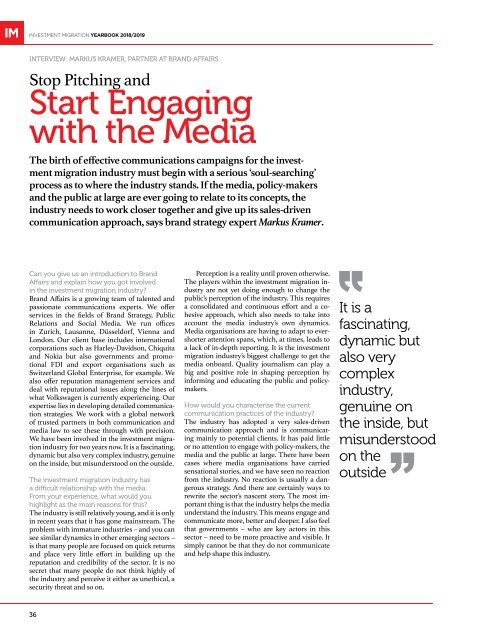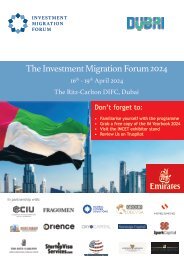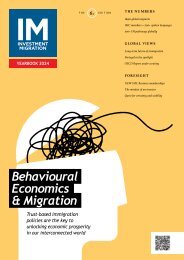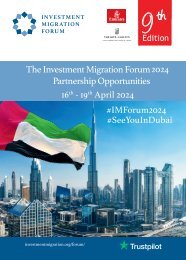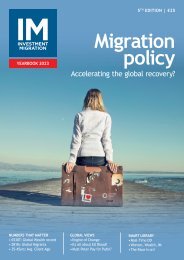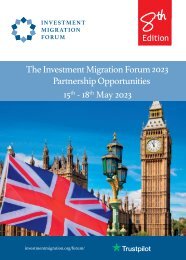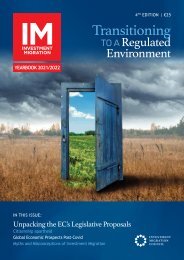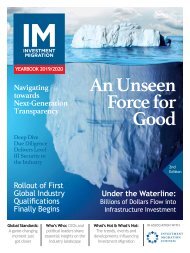IM Yearbook 2018/19
Created out of the need for a global, credible, “go-to” industry publication, the IM Yearbook offers valuable access to a prime target audience of your partners, your peers, and the foremost referral network leading to the world’s most influential RCbI programmes: senior level representatives of the global migration industry, academics, migration agents, migration law firms, wealth managers, UHNWI’s, government representatives, and international organisations involved in migration and citizenship-by-investment.
Created out of the need for a global, credible, “go-to” industry publication, the IM Yearbook offers valuable access to a prime target audience of your partners, your peers, and the foremost referral network leading to the world’s most influential RCbI programmes: senior level representatives of the global migration industry, academics, migration agents, migration law firms, wealth managers, UHNWI’s, government representatives, and international organisations involved in migration and citizenship-by-investment.
- No tags were found...
Create successful ePaper yourself
Turn your PDF publications into a flip-book with our unique Google optimized e-Paper software.
<strong>IM</strong> INVESTMENT MIGRATION YEARBOOK <strong>2018</strong>/20<strong>19</strong><br />
Interview: Markus Kramer, Partner at Brand Affairs<br />
Stop Pitching and<br />
Start Engaging<br />
with the Media<br />
The birth of effective communications campaigns for the investment<br />
migration industry must begin with a serious ‘soul-searching’<br />
process as to where the industry stands. If the media, policy-makers<br />
and the public at large are ever going to relate to its concepts, the<br />
industry needs to work closer together and give up its sales-driven<br />
communication approach, says brand strategy expert Markus Kramer.<br />
Can you give us an introduction to Brand<br />
Affairs and explain how you got involved<br />
in the investment migration industry?<br />
Brand Affairs is a growing team of talented and<br />
passionate communications experts. We offer<br />
services in the fields of Brand Strategy, Public<br />
Relations and Social Media. We run offices<br />
in Zurich, Lausanne, Düsseldorf, Vienna and<br />
London. Our client base includes international<br />
corporations such as Harley-Davidson, Chiquita<br />
and Nokia but also governments and promotional<br />
FDI and export organisations such as<br />
Switzerland Global Enterprise, for example. We<br />
also offer reputation management services and<br />
deal with reputational issues along the lines of<br />
what Volkswagen is currently experiencing. Our<br />
expertise lies in developing detailed communication<br />
strategies. We work with a global network<br />
of trusted partners in both communication and<br />
media law to see these through with precision.<br />
We have been involved in the investment migration<br />
industry for two years now. It is a fascinating,<br />
dynamic but also very complex industry, genuine<br />
on the inside, but misunderstood on the outside.<br />
The investment migration industry has<br />
a difficult relationship with the media.<br />
From your experience, what would you<br />
highlight as the main reasons for this?<br />
The industry is still relatively young, and it is only<br />
in recent years that it has gone mainstream. The<br />
problem with immature industries – and you can<br />
see similar dynamics in other emerging sectors –<br />
is that many people are focused on quick returns<br />
and place very little effort in building up the<br />
reputation and credibility of the sector. It is no<br />
secret that many people do not think highly of<br />
the industry and perceive it either as unethical, a<br />
security threat and so on.<br />
Perception is a reality until proven otherwise.<br />
The players within the investment migration industry<br />
are not yet doing enough to change the<br />
public’s perception of the industry. This requires<br />
a consolidated and continuous effort and a cohesive<br />
approach, which also needs to take into<br />
account the media industry’s own dynamics.<br />
Media organisations are having to adapt to evershorter<br />
attention spans, which, at times, leads to<br />
a lack of in-depth reporting. It is the investment<br />
migration industry’s biggest challenge to get the<br />
media onboard. Quality journalism can play a<br />
big and positive role in shaping perception by<br />
informing and educating the public and policymakers.<br />
How would you characterise the current<br />
communication practices of the industry?<br />
The industry has adopted a very sales-driven<br />
communication approach and is communicating<br />
mainly to potential clients. It has paid little<br />
or no attention to engage with policy-makers, the<br />
media and the public at large. There have been<br />
cases where media organisations have carried<br />
sensational stories, and we have seen no reaction<br />
from the industry. No reaction is usually a dangerous<br />
strategy. And there are certainly ways to<br />
rewrite the sector’s nascent story. The most important<br />
thing is that the industry helps the media<br />
understand the industry. This means engage and<br />
communicate more, better and deeper. I also feel<br />
that governments – who are key actors in this<br />
sector – need to be more proactive and visible. It<br />
simply cannot be that they do not communicate<br />
and help shape this industry.<br />
It is a<br />
fascinating,<br />
dynamic but<br />
also very<br />
complex<br />
industry,<br />
genuine on<br />
the inside, but<br />
misunderstood<br />
on the<br />
outside<br />
36


